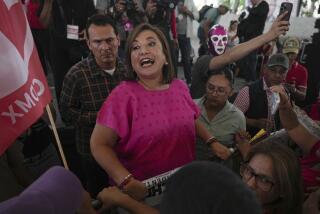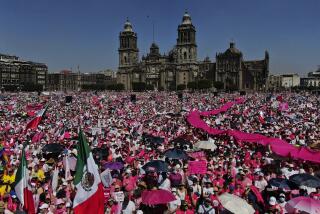Accessory to Larceny
- Share via
Ever the optimist, President Reagan professes to see in last Friday’s fraud-besmirched Philippines presidential election encouraging evidence of a thriving two-party system. Ever the would-be conciliator, he sends special envoy Philip C. Habib to Manila for the supposed purpose of assessing the post-election “desires and needs” of the Filipino people. Habib can save himself the trip. What Filipinos want is a redemption of the democracy that President Ferdinand E. Marcos has stolen from them. What Filipinos need is the departure of Marcos from Malacanang Palace so that the changes they voted for can in fact take place.
What Filipinos are about to get instead is a perpetuation of the Marcos regime, courtesy of the vote count performed by the Marcos-dominated National Assembly. What they are getting already is a campaign of violence against supporters of Mrs. Corazon Aquino, Marcos’ opponent in the presidential contest. The mass disenfranchisement of Aquino supporters, the theft of ballot boxes, the rigging of computer counts apparently has not been enough. Now the assassins have been set loose to take vengeance against those who worked for Marcos’ defeat.
The State Department seems to understand what is going on and perceives the dangers to U.S. interests if Washington lets itself become associated with Marcos’ theft of the election. Reagan and his political advisers give the impression of having another priority. Obsessed with the future of the U.S. air base at Clark Field and the naval base at Subic Bay, they sow the nonsensical implication that only under Marcos will those bases be secure. While not suggesting that the bases would be jeopardized under an Aquino presidency, they worry aloud that, if Aquino and her supporters refuse to accept the hoked-up election results, civil strife will erupt, the Communist-led insurgency will gain influence and ultimately the U.S. bases will be lost.
If these things do indeed happen it won’t be because Filipinos stubbornly refuse to stay passive in the face of electoral larceny. The insurgency that threatens the Philippines and U.S. interests draws its strength precisely from the blunders, corruption and brutality of the Marcos regime. A work force that is only 40% fully employed, a people that sees its children dying from malnutrition in the countryside, an electorate whose hopes for honest democracy have been cruelly frustrated cannot be expected forever to support the forces of political moderation. Those in Washington who cling to the hope that only Marcos can clean up the mess he himself created are being not simply naive but stupid.
Marcos is not a well man, or a popular one. His time almost certainly will run out long before the U.S. lease on the Philippines bases does in 1991, and it is on the post-Marcos period that American policy planning should right now be focusing. An Administration that has hailed the vote in the Philippines as a healthy manifestation of democracy can hardly object when Filippinos take to the streets to protest the flagrant and cynical nullification of the democratic process. Marcos has nothing in common with the principles the United States espouses. An Administration that stood behind those principles would and should be making that clear in unmistakable terms.
More to Read
Sign up for Essential California
The most important California stories and recommendations in your inbox every morning.
You may occasionally receive promotional content from the Los Angeles Times.













